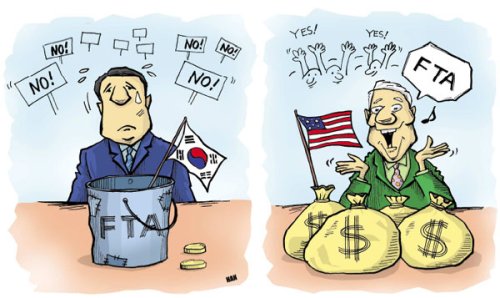Korea Herald | 11 July 2006
Massive rally planned against FTA
Opponents say trade deal with the U.S. will lead to poverty, loss of competitiveness
By Yoo Soh-jung
U.S. "economic colonization," "undemocratic," and a "path toward a miserable future for Korean citizens." These are the basic views held by Korean opponents of the free trade agreement that the Roh Moo-hyun government is pursuing with the United States.
In an ambitious attempt to stop the trade talks, as many as 100,000 opponents are expected to stage a pan-national rally tomorrow in major areas around Seoul, as both governments hold their second round of talks.
Representing various groups ranging from the farming industry to the media, the anti-Korea-U.S. (or KORUS) FTA group believes the Korean government is being pressured by Washington to make a hasty trade deal.
Contrary to the Roh administration’s belief that an FTA with the economic superpower would accelerate Korea’s efforts at becoming an advanced economy, opponents believe that the nation may lose out to the more globally competitive and advanced American trading regime.
Stirring this negative FTA sentiment and fostering doubts about a bright future is the Korean government’s refusal to publicize details of the trade talks. The first formal round was held from June 5 to 9 in Washington, D.C.

"How do we know if an FTA with the United States will guarantee a better livelihood, and guarantee security for Korean citizens if the government doesn’t publicize details of the negotiations," Kim Seung-geun, organizational manager of the National Union of Media Workers, told The Korea Herald. "This goes against the people’s democratic rights."
But the government stressed that it can only reveal partial contents of the talks because full disclosure during negotiations would be unwise and would put Korea at a disadvantage. Kim is one of the union’s 2,500 members expected at the mammoth rally. He urged for an accurate reporting of the FTA. Kim said he hopes his union could at least help raise public awareness over the dangers of a bilateral trade with the world’s largest economy.
The National Farmers Confederation, representing the most sensitive and belligerent of the anti-FTA groups, is also urging for a halt to the "suspicious" and "nontransparent" negotiations until all citizens’ opinions are heard and reflected in the talks.
"This FTA is only waiting to make all Korean people a part of a U.S. economic colony, throwing us into the path of a dark and uncertain future," Moon Kyung-sik, chair of the National Farmers Confederation, said in a statement.
The Korea Confederation of Trade Unions, one of the nation’s major umbrella unions, and the Korean Alliance against the Korea-U.S. FTA will also take part in the pan-national rally.
"The FTA will not only destroy the country’s agricultural sector but also contribute to creating more unstable, nonregular jobs," said the Korean Alliance, formed by an alliance of 282 trade unions and peasant organizations.
Opponents cite the North American Free Trade Agreement and Washington’s free trade pact with Mexico as examples of a poverty-stricken future; one that has plagued certain social groups in Canada and Mexico. However, the Korean government stresses that the cases have been blown out of proportion.
"Citing NAFTA and the U.S. FTA with Mexico as destructive examples of a free trade pact with the United States is extreme and an exaggeration of certain cases," Kim Jong-hoon, Seoul’s chief negotiator for the KORUS FTA talks, said at a news briefing on July 7.
Korea and the United States recorded $72 billion of trade in 2004. Once the free trade deal goes into effect, Korea’s exports to the United States could gain as much as 15.1 percent, or $7.1 billion, but imports from the United States would rise as much as 39.4 percent, or $12.2 billion, the Korea Institute for International Economic Policy said.
Overall, the free trade pact with the United States may increase Korea’s real gross domestic product by as much as 1.99 percent and create 104,000 jobs in the long term, KIEP said.
Korea is the world’s 10th-largest economy and the United States’ seventh-largest trading partner. Two-way trade in goods totaled about $72 billion last year.
As the increasing number of bilateral trade pacts among Asian economies, including China and 10 members of the Association of Southeast Asian Nations, serves to integrate the region, the United States feels anxious about losing its leveraging power in the region. Clinching a pact with Korea, which is East Asia’s third-largest economy after Japan and China, is also part of Washington’s plan to avoid losing its economic influence in Asia to China.
Commerce Minister Chung Sye-kyun, during a meeting organized by the Korea Chamber of Commerce and Industry last week, highlighted the long-term benefits of a bilateral trade pact with Washington.
"An FTA would allow the country to entice high-tech business, as well as research and development centers, which are crucial for sustainable growth," the minister said. He added that Seoul is making efforts to expand the country’s social security net to assist workers who could be hurt.
The chairman of the Korea International Trade Association, Lee Hee-beom, recently said that regionalism and FTAs are no longer an option but a matter of survival.
"A free trade agreement with the United States cannot be an exception to this trend. Admittedly, this agreement will bring losses as well as gains," he acknowledged. "But we must keep in mind that no nation has ever prospered by isolating itself from the global economy," he stressed.
According to some experts, the pan-national rally will not skid the Korea-U.S. FTA negotiation process.
"I don’t think the massive protest will affect the objective of the talks. Negotiations require negotiators to be icy cold," Suh Jin-kyo, a trade expert at the Korea Institute for International Economic Policy, said in a telephone interview.
Seoul currently has an FTA with Chile and Singapore. Korea also signed one on Dec. 15 with the European Free Trade Association, which comprises Switzerland, Norway, Iceland and Liechtenstein. It will come into effect in July.